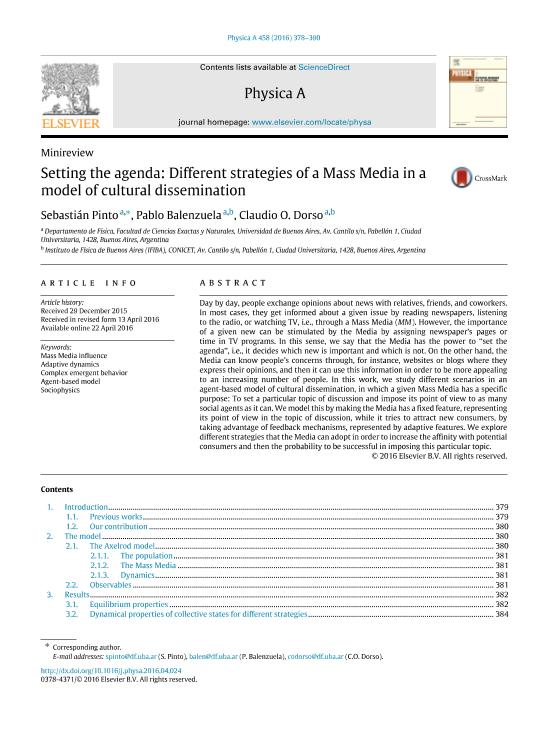Mostrar el registro sencillo del ítem
dc.contributor.author
Dorso, Claudio Oscar

dc.contributor.author
Balenzuela, Pablo

dc.contributor.author
Pinto, Sebastián

dc.date.available
2018-06-18T14:06:17Z
dc.date.issued
2016-09
dc.identifier.citation
Dorso, Claudio Oscar; Balenzuela, Pablo; Pinto, Sebastián; Setting the agenda: Different strategies of a Mass Media in a model of cultural dissemination; Elsevier Science; Physica A: Statistical Mechanics and its Applications; 458; 9-2016; 378-390
dc.identifier.issn
0378-4371
dc.identifier.uri
http://hdl.handle.net/11336/48944
dc.description.abstract
Day by day, people exchange opinions about news with relatives, friends, and coworkers. In most cases, they get informed about a given issue by reading newspapers, listening to the radio, or watching TV, i.e., through a Mass Media (<em>MM</em>). However, the importance of a given new can be stimulated by the Media by assigning newspaper?s pages or time in TV programs. In this sense, we say that the Media has the power to ?set the agenda?, i.e., it decides which new is important and which is not. On the other hand, the Media can know people?s concerns through, for instance, websites or blogs where they express their opinions, and then it can use this information in order to be more appealing to an increasing number of people. In this work, we study different scenarios in an agent-based model of cultural dissemination, in which a given Mass Media has a specific purpose: To set a particular topic of discussion and impose its point of view to as many social agents as it can. We model this by making the Media has a fixed feature, representing its point of view in the topic of discussion, while it tries to attract new consumers, by taking advantage of feedback mechanisms, represented by adaptive features. We explore different strategies that the Media can adopt in order to increase the affinity with potential consumers and then the probability to be successful in imposing this particular topic.
dc.format
application/pdf
dc.language.iso
eng
dc.publisher
Elsevier Science

dc.rights
info:eu-repo/semantics/openAccess
dc.rights.uri
https://creativecommons.org/licenses/by-nc-sa/2.5/ar/
dc.subject
Mass Media Influence
dc.subject
Adaptive Dynamics
dc.subject
Complex Emergent Behaviour
dc.subject
Agent-Based Model
dc.subject.classification
Astronomía

dc.subject.classification
Ciencias Físicas

dc.subject.classification
CIENCIAS NATURALES Y EXACTAS

dc.title
Setting the agenda: Different strategies of a Mass Media in a model of cultural dissemination
dc.type
info:eu-repo/semantics/article
dc.type
info:ar-repo/semantics/artículo
dc.type
info:eu-repo/semantics/publishedVersion
dc.date.updated
2018-06-12T16:07:58Z
dc.journal.volume
458
dc.journal.pagination
378-390
dc.journal.pais
Países Bajos

dc.journal.ciudad
Amsterdam
dc.description.fil
Fil: Dorso, Claudio Oscar. Universidad de Buenos Aires. Facultad de Ciencias Exactas y Naturales. Departamento de Física; Argentina. Consejo Nacional de Investigaciones Científicas y Técnicas. Oficina de Coordinación Administrativa Ciudad Universitaria. Instituto de Física de Buenos Aires. Universidad de Buenos Aires. Facultad de Ciencias Exactas y Naturales. Instituto de Física de Buenos Aires; Argentina
dc.description.fil
Fil: Balenzuela, Pablo. Consejo Nacional de Investigaciones Científicas y Técnicas. Oficina de Coordinación Administrativa Ciudad Universitaria. Instituto de Física de Buenos Aires. Universidad de Buenos Aires. Facultad de Ciencias Exactas y Naturales. Instituto de Física de Buenos Aires; Argentina. Universidad de Buenos Aires. Facultad de Ciencias Exactas y Naturales. Departamento de Física; Argentina
dc.description.fil
Fil: Pinto, Sebastián. Universidad de Buenos Aires. Facultad de Ciencias Exactas y Naturales. Departamento de Física; Argentina
dc.journal.title
Physica A: Statistical Mechanics and its Applications

dc.relation.alternativeid
info:eu-repo/semantics/altIdentifier/doi/http://dx.doi.org/10.1016/j.physa.2016.04.024
Archivos asociados
